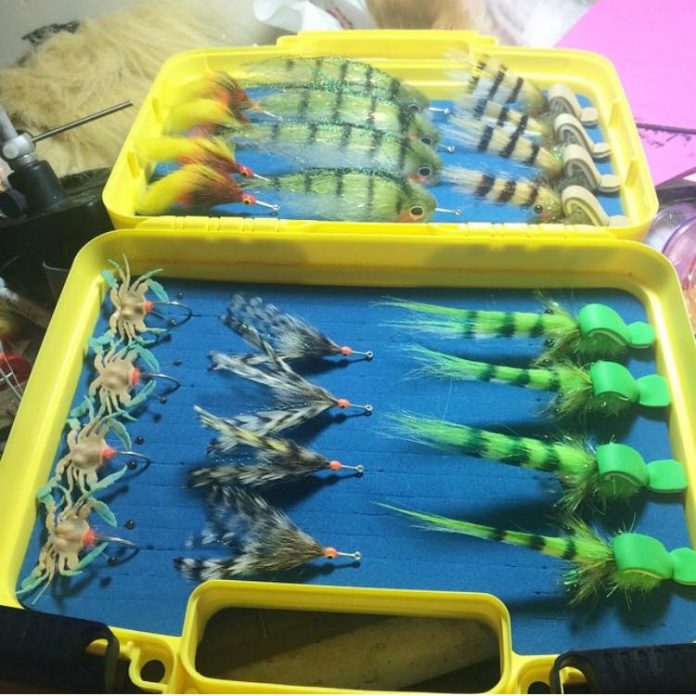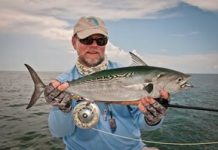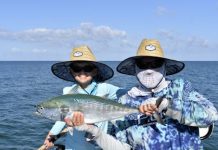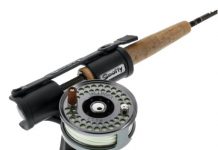By CAPT. PAT DAMICO, CapMel.com fly fishing editor

When taking out clients, I often ask them about previous experience with guided trips. This information is very helpful and varies across the whole spectrum from very good, to poor. Recently, the answers were from clients telling me about two guided trips. In both cases they wanted to catch redfish on a fly. They started fishing with flies, but soon switched after being unsuccessful. One trip was in South Carolina, the other on Florida’s west coast. Instead, they ended up fishing with shrimp and whitebait, and caught some fish. Why the switch? Is the reason there are times when fish will refuse flies and take only live bait? Yes, I’m sure there are instances when this is true. Could there be any other reasons why flies will fail? After getting more information, the reasons began to fall into a familiar pattern.
Most fly fisherman I know enjoy the challenge that fishing with the long rod presents. When they begin fly fishing they must also accept the journey that is necessary as they purse success. What is success? Success to many fly fisherman I know is not measured in how many fish are caught, but by how they are caught. One nice fish on the fly could make the whole day a worthwhile event. Stalking the fish, making a perfect presentation with a fly that you have tied, seeing the take, setting the hook and finally bringing the fish to hand where it can be admired, and often released, all make for a successful
outing. There are even times that fly fishing can outperform other fishing techniques. Catching freshwater trout in the middle of a mayfly hatch when the pattern is duplicated and well presented is one example. When snook are feeding at night on small baitfish, a fly that matches the hatch is very productive. The fly itself, many times, is a small part of the equation. When someone asks what fly pattern are you using, should he also ask how you are using it? Have you ever fished near someone, using identical equipment, who either outfished you or you beat them by a large margin? Let’s look at some reasons why flies may not be productive. We will begin with the guide.
If someone calls a guide and says they want to fly fish, very few guides will not take them as clients. It can be a decision based solely on economics. The guide may prefer to fish live bait or scented plastic spinning lures primarily, but without telling you this agrees to take you out. He may have a fly rod, or you bring your own equipment. This is your first saltwater fly fishing experience and you are understandably very excited. You’ve watched Lefty, Flip and others on Saturday morning make that perfect cast which resulted in instant success. You expect to do the same. The guide shows up with a tower boat and a livewell full of scales sardines, and a bunch of spinning rods with corks on the leader. How do you fly cast from a boat with a large tower in the middle, and what is the live bait doing there? My first saltwater “fly fishing trip,” about twenty years ago started similarly, with a well respected guide. I had several phone conversations with the guide before our trip telling him I wanted to catch fish with a fly rod. One fly rod rigged with a freshwater muddler minnow sat in the rod holder all day while we threw spinning outfits with live shrimp. We did catch fish, but it was not what I wanted to do. He did say, “Right now, this is the best way to catch fish.” Why, if he believed that, didn’t he tell me on the phone, or refer me to a fly fishing guide?
In another instance, the guide takes you out and after a couple fishless stops with you casting your fly rod, he suggests that maybe we should switch to spinning gear for awhile. Let’s say your casting skills were adequate, but the fish were holding close to the bottom in several feet of water, and a sinking fly on a clear sinking tip line would have worked. The guide’s inexperience was of no help here. Or, the fish were tailing in shallow water and his boat did not have a shallow enough draft to allow a stealthy, closer approach. He didn’t have a poling platform, or pole, which is needed under these circumstances, or you could have left the boat and approached the shallows by walking in the ankle deep water to get to the fish. A friend of mine who is a very busy live bait guide told me he never saw a tailing redfish. I frequently fish the same areas he does and we see them all the time. We usually wave to one another as he speeds by on his way to a “hole” where he anchors his boat and chums with stunned live greenbacks before beginning to fish his clients with baited hooks. I told him he never slows down long enough to watch the shallows for signs of tailers.
Under the above circumstances the guide may announce, “I fished a spot near here a few days ago, and we caught a bunch with shrimp.” You go to the spot, anchor the boat, and instantly hook up with a live shrimp. We have some excellent fly patterns that duplicate shrimp. Why not use one of them? After catching several fish, you don’t touch your fly rod for the rest of the trip. Was the fly pattern the reason for failure, or were your casting skills so poor that you couldn’t get the fly close to where the fish were? Did you make sloppy presentations that frightened fish in shallow water, were you unable to cast in the wind, did you false cast over the fish and spook them, or a myriad of other reasons relating to your lack of casting skill? When fellow guides, that are also excellent fly fisherman, discuss recent trips with me, their success will always relate to how well their client could cast. They have some poor days when fish are scarce, but on some of their best days when fish are located, the casting skill of the client will determine how the day went.
If you are having some casting problems, and you are amenable to some helpful suggestions, can the guide analyze your cast and be of assistance? If your skills are so poor, how do you feel about spending most of your trip learning how to properly cast? The deck of a flats boat is not the place to learn to cast a fly rod. I have had clients who after a few minutes of instruction were able to improve their casting sufficiently to have a good day with the fly. Others were either so inexperienced, or couldn’t admit that the problem was theirs, but rather some other reason, like the action of the rod, the brand of the rod, the rod’s length, or weight, or something else.
What can we do to insure that a fly fishing trip will have the best chance for success? Research the guide thoroughly? Study their website, have some candid conversations, or written communication with him, or her. Get some references. Be sure to explain your experience level. If you need to prepare yourself, sign up for a saltwater casting clinic, or get lessons from someone who is skilled in the areas you need help. The Federation of Fly Fishers has a casting certification program that is rigorous and will help narrow your choices of where to begin.
I began fly fishing at the age of ten. I enjoy the sport now more than ever. Many people have contributed to my continual learning experience in both fresh and saltwater. Saltwater fly fishing will definitely provide you with the most excitement available in our great sport. Take advantage of it by doing your homework
Capt. Pat Damico, Fly Guy Charters, a FFF Certified Fly Casting Instructor, fishes lower Tampa Bay and can be reached at 727-504-8649 or www.captpat.com.
- Captain’s Corner:Pat Damico - June 25, 2019
- Flat water makes seeing tarpon easier - May 17, 2017
- Warm rivers holding plenty of targets for fly fishermen - February 16, 2017











